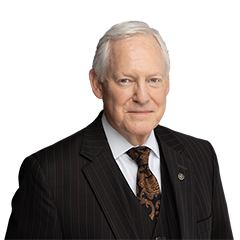By: David W. Wulfers
Is a trustee of a trust entitled to compensation for services rendered as trustee and for reimbursement of expenses when the trust is silent regarding trustee compensation and reimbursement? Sometimes the terms of a trust will not describe how a trustee is to be compensated for services the trustee provides to the trust, or how a trustee is to be reimbursed for expenses the trustee pays out of its funds for the trust. In those instances, Oklahoma law fills in the gaps.
Compensation for Services
The Oklahoma Trust Act provides a trustee should be reasonably compensated from trust assets for services the trustee provides to the trust. The Act provides,
A trustee acting in a fiduciary capacity, as herein authorized, is entitled to receive such compensation or commission as provided for in the trust agreement or other contract. If the amount of such compensation or commission is not regulated by or stipulated in the trust agreement, the trustee may charge and deduct a reasonable compensation or commission for the services rendered and the responsibilities assumed. Where the trustee is acting under appointment by a court, such compensation or commission shall be paid, irrespective of the provisions in the trust instrument, as allowed or approved by that court.[1]
When a trustee has been appointed by a court to administer a trust, one Oklahoma court has described several factors to be considered in determining a trustee’s compensation for services it provides to the trust,
In the absence of trust terms or statutory provisions setting compensation guidelines, Oklahoma law is not well-established on the question of how court-appointed trustees’ fees are to be determined, that is, the factors to be considered in arriving at a reasonable fee, other than the language in Swanson[2] to consider “the services rendered and the responsibilities assumed.” We are persuaded that the Restatement (Third) of Trusts provides appropriate guidance on relevant factors:
[T]he trustee’s skill, experience and facilities, and the time devoted to trust duties;
[T]he amount and character of the trust property;
[T]he degree of difficulty, responsibility, and risk assumed in administering the trust, including in making discretionary distributions;
[T]he nature and costs of services rendered by others; and
[T]he quality of the trustee’s performance. Restatement (Third) of Trusts § 38 cmt. c(1) (2003).
We find further guidance in two additional factors similar to those long-enunciated in State ex rel. Burk v. City of Oklahoma City, 1979 OK 115, ¶ 8, 598 P.2d 659, 661, used in setting reasonable attorney fees: the customary fee for similar services in the locality, and any time limitations imposed by the court or the circumstances.[3]
288 P.3d at 267.
One or more of the seven factors used to establish reasonable compensation for the court-appointed trustee described above can also be utilized by a trustee to establish the reasonable compensation due it when a court is not involved in determining compensation.[4] Section 175.48 of the Oklahoma Trust Act empowers a trustee to make this determination with the language “the trustee may charge and deduct a reasonable compensation or commission for the services rendered and the responsibilities assumed.” For example, a trustee of a trust owning several rental properties, which requires the trustee to devote a substantial amount of time to maintain the properties and to collect rent and possibly file eviction cases on a regular basis, may determine its compensation based on fees a property management company in the locality charges for similar services.
Reimbursement of Expenses
In addition to reasonable compensation, a trustee is entitled to be reimbursed with interest from trust assets for advances made by the trustee of its funds to pay expenses of the Trust. The Oklahoma Trust Act provides,
3. A trustee shall have a lien and may be reimbursed with interest for, or pay or discharge out of the trust property, either principal or income or both, all advances made for the benefit or protection of the trust or its property and all expenses, losses, and liabilities, not resulting from the negligence of the trustee, incurred in or about the execution or protection of the trust or because of the trustee holding or ownership of any property subject thereto; . . . .[5]
In conclusion, when the terms of a trust do not provide for compensation for services a trustee provides to the trust, or for reimbursement of expenses a trustee pays out of its funds for the trust, Oklahoma law provides a trustee is entitled to reasonable compensation and entitled to be reimbursed with interest for all advances and all expenses of the trust paid by the trustee from its individual funds.
Doerner, Saunders, Daniel & Anderson, LLP provides this content for informational purposes only. It is not intended to provide legal or other professional advice nor does the transmission of this information create an attorney-client relationship between any attorney of the Firm and the reader. If you seek legal advice or assistance, please consult with a competent attorney familiar with the applicable laws. If you wish to initiate possible representation by an attorney with this Firm, please call the attorney of your choice. You will be advised of our processes to avoid conflicts of interest and requirements of our letter of engagement before the commencement of representation.
[1]Okla. Stat. tit. 60, § 175.48 (emphasis added).
[2]Swanson v. Bates, 1949 OK 231, ¶ 40, 211 P.2d 781, 788.
[3]Belle Isle v. Brady, 2012 OK CIV APP 99, ¶ 32, 288 P.3d 259, 267.
[4]The Oklahoma Trust Act also provides a means for the trustee to ask a court to determine its compensation, in Section 175.23 of the Act.
[5]Okla. Stat. tit. 60, § 175.24(B) (emphasis added).


